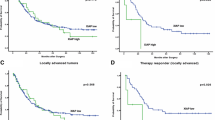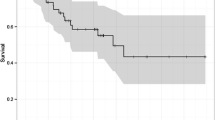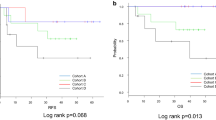Abstract
Resectable esophageal adenocarcinoma (EAC) patients often receive chemoradiation followed by surgery. However, most patients experience recurrences. Overexpression of MTDH, an oncoprotein with multiple functions, has been found to be associated with poor prognosis in breast cancer, glioblastoma, melanoma and various gastrointestinal malignancies, but not in EAC. We sought to establish its role in resistant EAC (post-treatment residual EAC). MTDH was assessed by immunohistochemistry in resected EAC, and results were correlated with clinical outcomes. MTDH expression was detectable in 72.5% (50/69) of patients, while expression levels were high (positive) in 50.7% (35/69). Of 69 patients analyzed, 25 had no relapse and 44 patients had a relapse (8 with local–regional and 36 with distant). The median follow-up duration was 3 years (0.4–11.6). The median overall survival was not associated with MTDH status (2.79 years for MTDH-negative and 3.60 years for MTDH-positive patients, p = 0.121). In addition, MTDH was not associated with either the type of relapse (local or distant), baseline clinical stage, tumor grade, presence of signet ring cells, surgical (yp) stage, percentage of residual EAC or presence of lymphovascular invasion. Our data reveal that MTDH is not a prognostic biomarker in resistant EAC after trimodality therapy.


Similar content being viewed by others
References
Torre LA, Bray F, Siegel RL, et al. Global cancer statistics, 2012. CA Cancer J Clin. 2015;65:87–108.
Pohl H, Sirovich B, Welch HG. Esophageal adenocarcinoma incidence: Are we reaching the peak? Cancer Epidemiol Biomark Prev. 2010;19:1468–70.
Ajani JA, D’Amico TA, Almhanna K, et al. Esophageal and esophagogastric junction cancers, version 1.2015. J Natl Compr Cancer Netw. 2015;13:194–227.
Su ZZ, Kang DC, Chen Y, et al. Identification and cloning of human astrocyte genes displaying elevated expression after infection with HIV-1 or exposure to HIV-1 envelope glycoprotein by rapid subtraction hybridization, RaSH. Oncogene. 2002;21:3592–602.
Britt DE, Yang DF, Yang DQ, et al. Identification of a novel protein, LYRIC, localized to tight junctions of polarized epithelial cells. Exp Cell Res. 2004;300:134–48.
Brown DM, Ruoslahti E. Metadherin, a cell surface protein in breast tumors that mediates lung metastasis. Cancer Cell. 2004;5:365–74.
Tian S, Roepman P, Van’t Veer LJ, et al. Biological functions of the genes in the mammaprint breast cancer profile reflect the hallmarks of cancer. Biomark Insights. 2010;5:129–38.
Emdad L, Sarkar D, Su ZZ, et al. Astrocyte elevated gene-1: recent insights into a novel gene involved in tumor progression, metastasis and neurodegeneration. Pharmacol Ther. 2007;114:155–70.
Luo Y, Zhang X, Tan Z, et al. Astrocyte elevated gene-1 as a novel clinicopathological and prognostic biomarker for gastrointestinal cancers: a meta-analysis with 2999 patients. PLoS ONE. 2015;10:e0145659.
Emdad L, Das SK, Dasgupta S, et al. AEG-1/MTDH/LYRIC: signaling pathways, downstream genes, interacting proteins, and regulation of tumor angiogenesis. Adv Cancer Res. 2013;120:75–111.
Taketa T, Sudo K, Correa AM, et al. Post-chemoradiation surgical pathology stage can customize the surveillance strategy in patients with esophageal adenocarcinoma. J Natl Compr Canc Netw. 2014;12:1139–44.
Dong L, Qin S, Li Y, et al. High expression of astrocyte elevated gene-1 is associated with clinical staging, metastasis, and unfavorable prognosis in gastric carcinoma. Tumour Biol. 2015;36:2169–78.
Yang C, Zheng S, Liu Q, et al. Metadherin is required for the proliferation, migration, and invasion of esophageal squamous cell carcinoma and its meta-analysis. Transl Res. 2015;166(614–626):e612.
Li S, Guo X, Ma X, et al. Expression of astrocyte elevated gene-1 closely correlates with the angiogenesis of gastric cancer. Oncol Lett. 2014;7:1447–54.
Kaplan EL, Meier P. Nonparametric estimation from incomplete observations. J Am Stat Assoc. 1958;53:457–81.
Cox DR. Regression models and life tables (with discussion). J R Stat Soc B. 1972;34:187–220.
Yu C, Chen K, Zheng H, et al. Overexpression of astrocyte elevated gene-1 (AEG-1) is associated with esophageal squamous cell carcinoma (ESCC) progression and pathogenesis. Carcinogenesis. 2009;30:894–901.
Yoo BK, Emdad L, Su ZZ, et al. Astrocyte elevated gene-1 regulates hepatocellular carcinoma development and progression. J Clin Invest. 2009;119:465–77.
Zhu K, Dai Z, Pan Q, et al. Metadherin promotes hepatocellular carcinoma metastasis through induction of epithelial-mesenchymal transition. Clin Cancer Res. 2011;17:7294–302.
Jian-bo X, Hui W, Yu-long H, et al. Astrocyte-elevated gene-1 overexpression is associated with poor prognosis in gastric cancer. Med Oncol. 2011;28:455–62.
Li G, Wang Z, Ye J, et al. Uncontrolled inflammation induced by AEG-1 promotes gastric cancer and poor prognosis. Cancer Res. 2014;74:5541–52.
Baygi ME, Nikpour P. Deregulation of MTDH gene expression in gastric cancer. Asian Pac J Cancer Prev. 2012;13:2833–6.
Bhatnagar A, Wang Y, Mease RC, et al. AEG-1 promoter-mediated imaging of prostate cancer. Cancer Res. 2014;74:5772–81.
Acknowledgements
Our paper was supported in part by the Grants from NCI, Department of Defense and MDACC (CA129906, CA129926, CA138671, CA1727741, CA150334.01 and CA160445) and Cancer Center Support Grant (NCI Grant P30 CA016672).
Author information
Authors and Affiliations
Corresponding author
Ethics declarations
Conflict of interest
The authors declare that they have no conflict of interest for this study.
Ethical approval
All procedures performed in studies involving human participants were in accordance with the ethical standards of the institutional and/or national research committee and with the 1964 Helsinki Declaration and its later amendments or comparable ethical standards.
Informed consent
Informed consent was obtained from all individual participants included in the study.
Rights and permissions
About this article
Cite this article
Mizrak Kaya, D., Dong, X., Nogueras-González, G.M. et al. Post-trimodality expression levels of metadherin (MTDH) as a prognostic biomarker for esophageal adenocarcinoma patients. Med Oncol 34, 135 (2017). https://doi.org/10.1007/s12032-017-0994-2
Received:
Accepted:
Published:
DOI: https://doi.org/10.1007/s12032-017-0994-2




